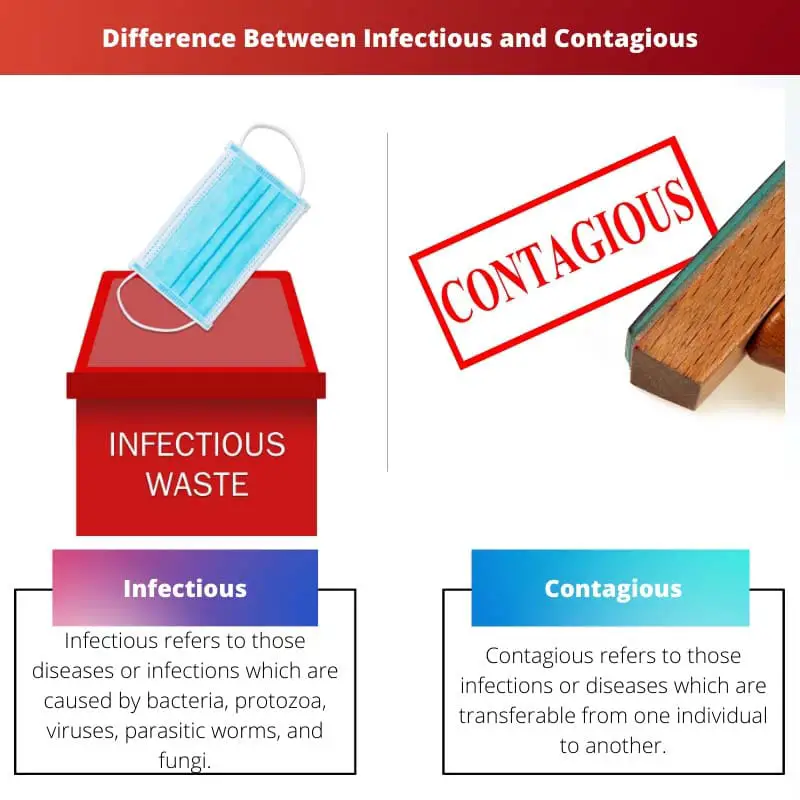Diseases and infections come without notice. At most times, such diseases and infections have varying symptoms and modes of transmission that may be confused as identical Infectious and contagious are two such examples of diseases.
The terminologies are infectious and contagious vary in several aspects.
Key Takeaways
- Infectious diseases result from pathogens such as bacteria, viruses, fungi, or parasites.
- Contagious diseases spread directly or indirectly from person to person.
- All contagious diseases are infectious, but not all infectious diseases are contagious.
Infectious vs Contagious
Infectious refers to the ability of a disease or agent to enter and multiply in a host organism caused by microorganisms such as bacteria, viruses, and parasites. Contagious refers to the ability of a disease or agent to spread from one individual to another through direct or indirect contact.

Infectious is an infection resulting from interaction with one or more pathogenic agents. In addition, the agents of infectious diseases are microorganisms that are present in the environment. The treatment of every infectious disease depends on the severity and impact on the immune system. Doctor consultation is pivotal for some infectious diseases.
Contagious translates to communicable by contact. Contagious diseases are a type of infectious disease. Moreover, contagious diseases are transferable in a variety of ways.
The most significant mode of transmission is physical contact. Several precautionary steps can be put in place to avoid the spread of infectious diseases.
Comparison Table
| Parameters of Comparison | Infectious | Contagious |
|---|---|---|
| Meaning | Infectious refers to those diseases or infections which are caused by bacteria, protozoa, viruses, parasitic worms, and fungi. | Contagious refers to those infections or diseases which are transferable from one individual to another. |
| Differing Factor | Not all infectious diseases are contagious. | All contagious diseases are infectious. |
| Origin | The word infectious originates from the Latin word inficere meaning dip in, taint. | The word contagious originates from the Latin word contagiosusmeaning contact or touching together. |
| Effect | Infectious diseases have internal effects for the body. | Contagious diseases yield external effects for the body. |
| Examples | Examples of infectious diseases are E. coli, malaria, measles, mumps, diphtheria, and polio. | Examples of contagious diseases are chickenpox, common cold, and influenza. |
What is Infectious?
By definition, infectious refers to an infection caused by one or more pathogenic agents. Examples of infectious agents include bacteria, protozoa, viruses, parasitic worms, and fungi.
An infectious agent or disease refers to one capable of transferring rapidly from one source to another. There are several examples of infectious diseases.
Some examples of infectious diseases include chickenpox, E. coli, influenza, malaria, measles, mumps, common cold, diphtheria, polio, pneumonia, rocky mountain spotted fever, rubella, SARS, tetanus, tuberculosis, and whooping cough.
The agents of infectious diseases are microorganisms that are present in the environment.
Although every disease has its specific symptoms, there are some common symptoms of infectious diseases. The symptoms include fever, fatigue, diarrhoea, and muscle aches.
The treatment of every infectious disease depends on the severity and impact on the immune system. Doctor consultation is pivotal for some infectious diseases.
The treatment of infectious diseases involves the use of antibiotics. In the case of viruses, treatment may use antiviral medications. Over the years, some diseases have become resistant to drugs.
Treatment for fungal infections involves the use of antifungals. To conclude, infectious diseases have several symptoms and treatments.

What is Contagious?
By definition, contagious refers to diseases capable of bodily transmission from an infected person or object. Contagious translates to communicable by contact.
Contagious diseases are a subcategory of infectious diseases. Thus, infectious and communicable diseases are contagious diseases.
Examples of contagious diseases include cold, flu, strep throat, and chickenpox. Contagious diseases may be spread in several ways. The most common mode of transmission is physical contact.
For instance, chickenpox is a contagious disease that spreads from one infected person to another individual when they come in contact.
Another mode of transmission of contagious diseases is through air particles when the infected person coughs or sneezes.
For example, a cold or flu is a contagious disease that transmits from one infected person to another through air particles. Infectious diseases may spread by touching or using the products of the infected person.
Sexually Transmitted diseases are another contagious disease that spreads through oral, physical or anal sex. Several precautionary steps must be put in place to avoid the spread of infectious diseases.
An individual must always wash his hands before eating and maintain a distance from the infected person.

Main Differences Between Infectious and Contagious
- Infectious refers to those diseases or infections caused by bacteria, protozoa, viruses, parasitic worms, and fungi. On the other hand, contagious refers to those infections or diseases that are transferable from one individual to another.
- Not all infectious diseases are contagious. But all contagious diseases are infectious.
- Infectious diseases include E. coli, malaria, measles, mumps, diphtheria, and polio. On the other hand, examples of contagious diseases are chickenpox, the common cold, and influenza.
- The word infectious originates from the Latin word inficere, meaning dip in, taint. In contrast, the word contagious originates from the Latin word contagious, meaning contact or touching together.
- Infectious diseases have internal effects on the body. On the other hand, contagious diseases yield external effects on the body.

- https://kidshealth.org/en/teens/contagious.html#:~:text=Some%20%E2%80%94%20but%20not%20all%20%E2%80%94%20infectious,not%20contagious%20from%20another%20human
- https://www.dictionary.com/e/contagious-vs-infectious-the-difference-can-be-important/

This post is very well structured and I really appreciated it!
I don’t agree with some of the facts, you should check reliable sources.
This post is a mix of serious information with a hint of humor, I loved it!
I had no idea about the difference between these two terms, thanks for sharing!
A very interesting comparison and the details are very well explained.
This is a very informative post, provided me with lots of valuable insights.